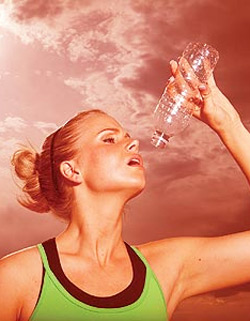|
|
|
 , ,
Font size |
Heat-related Illness
 Warm weather means activities and fun under the
sun! Whether
you love putting on shorts and feeling the warm outdoors, or find it hot and
sticky, everyone must be careful not to let a heat-related illness spoil the
day. Warm weather means activities and fun under the
sun! Whether
you love putting on shorts and feeling the warm outdoors, or find it hot and
sticky, everyone must be careful not to let a heat-related illness spoil the
day.
Normally, the body has ways of keeping itself cool, by letting heat escape
through the skin, and by evaporating sweat (perspiration). If the body does not
cool properly or does not cool enough, the victim may suffer a heat-related
illness. Anyone can be susceptible although the very young and very old are at
greater risk. Heat-related illnesses can become serious or even deadly if
unattended.
Stages
of Heat-Related Illness
Heat-related illness usually comes in stages. The signal of the first stage is
heat cramps in muscles. These cramps can be very painful. If you are
caring for a person who has heat cramps, have him or her
stop activity and rest. If the person is fully awake and alert, have him or
her drink small amounts of cool water or a commercial sports drink. Gently
stretch
the cramped muscle and hold the stretch for about 20 seconds, then gently
massage
the muscle.
The signals of the next, more serious stage of a heat-related illness (often
called heat exhaustion) include:
-
Cool, moist,
pale
skin
(the skin may be red right after physical activity).
-
Headache.
-
Dizziness and
weakness or exhaustion.
-
Nausea.
-
The skin may
or may not feel hot.
|
The signals of the late stage of a heat-related illness (often called heat
stroke) include:
-
Vomiting.
-
Decreased
alertness level or complete loss of consciousness.
-
High body
temperature (sometimes as high as 105oF).
-
Skin may still
be moist or the victim may stop sweating and the skin may be
red, hot and dry.
-
Rapid, weak
pulse.
-
Rapid, shallow
breathing.
|
How can I prevent heat illness?
When the heat index is high, stay indoors in air-conditioned areas when
possible. If you must go outside, take the following
precautions:
-
 Wear lightweight, light-colored, loose-fitting clothes. Wear lightweight, light-colored, loose-fitting clothes.
-
Eat small meals and eat more often. Avoid foods that are high in
protein which increase metabolic heat.
-
Protect
yourself from the sun by wearing a hat or using an umbrella.
-
-
Drink plenty of
water before starting an outdoor activity. Drink extra water all
day. Drink fewer beverages that contain caffeine (such as tea,
coffee and cola) or alcohol.
-
Schedule vigorous outdoor activities for cooler times of the
day--before 10 a.m. and after 6 p.m.
-
During
an outdoor activity, take frequent breaks. Take time out to find a
cool place. If you recognize that you, or someone else, is showing the
signals of a heat-related illness, stop activity and find a cool place.
Remember, have fun, but stay cool! Drink water or other fluids every 15 to
20 minutes, even if you don't feel thirsty. If you have clear, pale urine,
you are probably drinking enough fluids.
-
If you have a chronic
medical problem,
ask your doctor about how to deal with the heat, about drinking extra fluids
and about your medicines.
Dated 10 March 2015
Related Links
|
|
|
|
|









